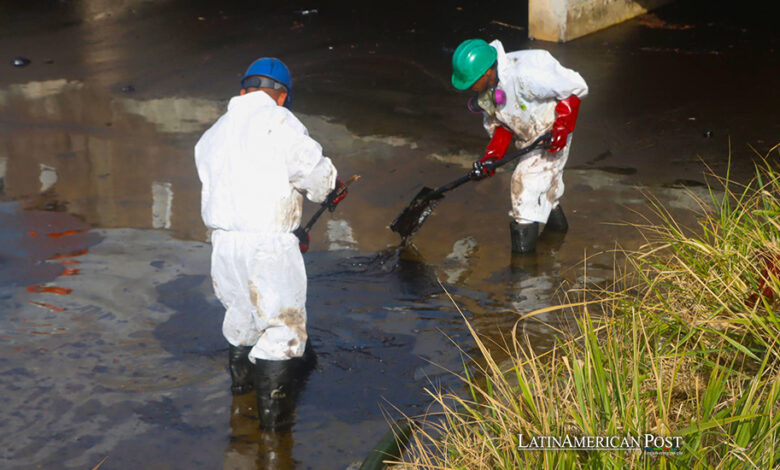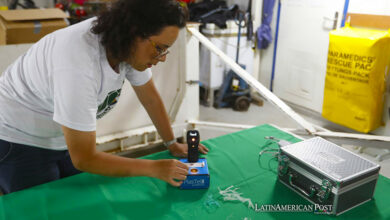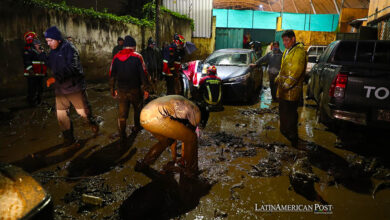Tackling Tobago’s Oil Spill Crisis Leads to a Regional Reflection on Environmental Challenges

Following a significant oil spill on its western coast, Tobago’s Emergency Management Agency (TEMA) reports progress towards containment, spotlighting the Caribbean’s ongoing battle with environmental hazards. This incident not only underscores the vulnerability of island ecosystems but also echoes similar environmental crises across Latin America.
Navigating Environmental Perils in Tobago: A Call for Resilience
The recent oil spill off the western coast of Tobago has sparked an intense response from local and international environmental teams, highlighting a recurring challenge faced by the Caribbean and other Latin American regions: the battle against environmental degradation caused by industrial accidents. As Allan Stewart, the director of Tobago’s Emergency Management Agency (TEMA), announced a move towards stabilization, the incident sheds light on the broader narrative of environmental resilience and response in the face of adversity.
The spill, caused by at least two vessels—a tugboat and a barge en route from Panama to Guyana—has marred the coastline and threatened marine life and local livelihoods. Yet, the proactive measures taken by TEMA and various companies to contain the spill, coupled with the effective deployment of the national contingency plan, reflect a growing expertise in handling such disasters, a testament to the region’s hard-earned lessons over the years.
Historically, Latin America and the Caribbean have been no strangers to environmental crises, whether due to natural disasters or anthropogenic hazards like oil spills. From the catastrophic Deepwater Horizon spill in the Gulf of Mexico in 2010 to more minor yet impactful incidents across Venezuela, Brazil, and Mexico, the region has a storied history with oil-related disasters. These events wreak havoc on the environment and expose the socioeconomic vulnerabilities of dependent communities, emphasizing the need for robust environmental governance and disaster preparedness.
Multifaceted Response Strategies Across the Region
The response in Tobago, involving the cordoning off of affected areas and the collaboration between government officials, environmental experts, and local communities, mirrors the multifaceted approach increasingly seen across Latin America. Following the 2019 oil spill that affected over 2,000 km of its coastline, nations like Brazil have similarly rallied around comprehensive response strategies involving everything from scientific research to community mobilization.
Moreover, the Tobago oil spill underscores the importance of regional cooperation and the sharing of best practices. The Caribbean has long advocated for environmental sustainability and disaster resilience, given its susceptibility to hurricanes and other natural disasters. This incident reinforces the call for enhanced regional frameworks to manage ecological hazards, drawing on the collective experiences of Caribbean and Latin American nations alike.
Beyond the immediate response, the spill in Tobago raises critical questions about the long-term environmental impact, particularly on marine biodiversity and coastal ecosystems. The arrival of oil spill response experts on the island to conduct quality control and impact assessments echoes similar initiatives across Latin America, where environmental monitoring and rehabilitation have become cornerstones of post-disaster recovery efforts. The focus on rescuing affected wildlife and cleaning up impacted areas highlights an evolving understanding of the intricate balance between economic development and environmental stewardship.
This incident also highlights the legal and regulatory challenges facing the region. The abandonment of the vessels responsible for the spill points to the broader issue of maritime regulation and oversight, a concern shared by many Latin American countries grappling with the influx of foreign-flagged vessels in their waters. Strengthening maritime governance and enhancing international cooperation to prevent such incidents are increasingly recognized as regional priorities.
The community’s resilience in Tobago, with officials like Chief Secretary Farley Augustine reassuring the public about the unaffected status of most beaches and marine ecosystems, reflects a broader spirit of optimism and determination prevalent across the Caribbean and Latin America. Despite the challenges posed by environmental hazards, there is a solid commitment to recovery, sustainability, and the protection of natural heritage.
Lessons Learned: Toward Regional Solidarity
As Tobago works to overcome the oil spill’s aftermath, the incident serves as a reminder of the vulnerabilities and strengths of island nations and coastal communities in Latin America. The collaborative response, emphasizing immediate action and long-term environmental care, offers valuable lessons for similar challenges elsewhere in the region. It highlights the importance of preparedness, community engagement, and regional solidarity in ecological crises.
Also read: Colombia Bolsters Firefighting Arsenal With Drug Crop Fumigation Planes Amid El Niño
The oil spill off Tobago’s coast is more than a localized environmental issue; it reflects the broader challenges and opportunities facing Latin America and the Caribbean in pursuing sustainable development and ecological resilience. As the region continues to navigate the complexities of industrialization, climate change, and environmental preservation, the lessons learned from incidents like the Tobago oil spill are invaluable. They underscore the need for continued investment in environmental governance, disaster preparedness, and regional cooperation to safeguard the natural beauty and biodiversity that define this vibrant part of the world.





